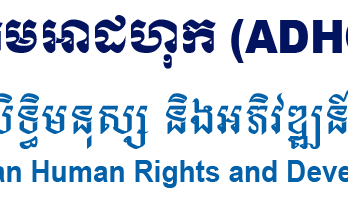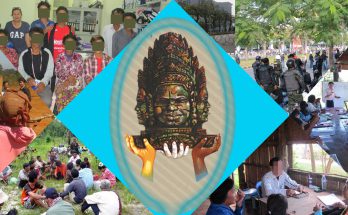On 08th October 2012, past residents of the Dey Krahorm community in central Phnom Penh gathered at the site of their former homes to petition the National Assembly to put an end to pervasive land-grabbing and forced evictions across Cambodia. The residents of Dey Krahorm were forcibly evicted and the community razed on 29 January 2009, when armed police, military police and demolition workers came at night to tear down houses and move people off their land. In many cases residents did not have time to move their possessions outside of their houses before they were pulled down by the demolition teams.
Many of the residents were moved to the Daak Trayoung resettlement site outside of the city, away from their jobs and with little opportunity for alternative employment. The Office of the High Commissioner for Human Rights (OHCHR) reported in 2009 that “access to water, sanitation and facilities such as schools is woefully inadequate [there],” leaving little wonder as to why residents were hesitant to leave their homes at Dey Krahorm.
Demonstrators posed for photographs wearing headpieces in the shape of houses and carrying messages advocating housing rights for all.
In a show of solidarity, other communities which have been evicted, or are facing eviction in the future, signed the petition, including the Boeung Kak community and former residents of Borei Keila, who continue to battle for fair compensation for land and property lost following forced eviction.
Land grabbing and forced evictions remain a critical issue in Cambodia. On the 24th September 2010 the United Nations Special Rapporteur for Cambodia, Professor Surya P. Subedi, released a highly critical report on land concessions and forced evictions in the country. In it he stated: “it is not clear to what extent the people of Cambodia have actually benefited from land concessions and I am concerned that, despite the Government‘s commitment to fighting corruption, many concessionaires operate behind a veil of secrecy.”
ADHOC calls on the Cambodian government to respect its international human rights obligations, in addition to national laws such as the 2001 Land Law, which set out the provisions through which land concessions can be granted. The needs of the Cambodian people should be at the heart of the country’s development strategy, in a framework which respects human rights and pays fair compensation and/or provides adequate resettlement for affected communities, to ensure that the benefits of development are spread to all Cambodians.
For more information, please contact:
Mr. Ny Chakrya, Head of Section: 011 274 959 (Khmer, English)
Mr. Neil Loughlin, Technical Assistant: 092 648 318: loughlin.adhoc@gmail.com (English)





